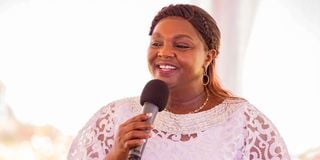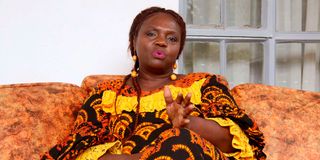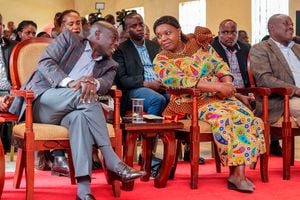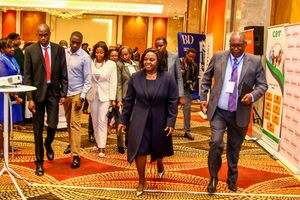
Rigathi Gachagua’s wife Pastor Dorcas Wanjiku.
Before she got into the spotlight as the Deputy president’s wife and recently as the spouse who wept for her man, life had inflicted on Pastor Dorcas Rigathi many scars from numerous struggles.
Some were psychological scars from the time she used to work as a househelp who was not allowed to eat in the main house. More scars came in the form of trauma from having to sleep in a chicken pen with her siblings, which led to physical scars caused by jigger infestation and horrible nightmares from memories of the death of one of her siblings inside that chicken pen.
There were some other traumas due to being ridiculed and forced to undress in front of adults as a young partial orphan unable to get a new dress for Christmas like her cousins.
Just when she and her husband had reached the near-pinnacle of power and influence, life threw her another curveball.
The ejection of her husband, Rigathi Gachagua, from the deputy president position a week ago was another low moment in the eventful life of the 58-year-old.
Photos of Mrs Gachagua crying as she held her husband’s arm while they left the Karen Hospital following days of admission for chest pains captured the imagination of many. It was a succinct illustration of a sudden change in status.
In 2022, she had taken up her duties as the spouse of the deputy president with gusto, crisscrossing the country to undertake various projects.
In an interview with Nation.Africa just weeks to the 2022 General Election, she said she wanted to focus on the youth and women. Fighting drug abuse was at the top of her priorities.
When the Kenya Kwanza coalition carried the day, she sought to stay true to her ambition. When one goes through the press releases that were sent from her team to newsrooms regarding her activities, it is clear that she was a woman on a mission.
However, her aspirations suffered a blow a few months ago when President William Ruto announced that her office, and that of First Lady Rachel Ruto, would not receive any funding due to budgetary adjustments forced by the shelving of the Finance Bill, 2024.

Pastor Dorcas Wanjiku Rigathi at her home in Karen, Nairobi.
That was just one of the many setbacks that have confronted Mrs Gachagua, who faced a tough life alongside her seven siblings from the time their father died when she was 11 and their mother struggled to fend for them.
From being a poor, jigger-infested girl to joining Alliance Girls High School when there was little hope of her proceeding to secondary school; from a “depressed” university student who breached presidential security one day so she could be killed to being the Deputy President’s wife, Mrs Gachagua’s life has been a rollercoaster.
Kiandutu slums
One of her first setbacks in life was moving from their home in Murang’a to the Kiandutu slums in Thika after the death of her father.
But even before the father died, the family had suffered tribulations. The father, a businessman, spent time in jail due to the loss of goods that were in transit.
“At one time, somebody asked him to transport some blankets, and they were stolen. And so he was jailed,” said Mrs Gachagua in the interview.
As he languished behind bars, his businesses collapsed. Mrs Gachagua's mother had to sell the two shops the father was operating in Nakuru, Kenya and Dar es Salaam, Tanzania.
He was in jail for about four years. When he was released, he struggled to re-establish himself.
“He died of depression,” Mrs Gachagua said.
As if that wasn’t bad enough, their mother went missing shortly after the father died. She was away for six months.
“We didn’t know where she was,” Mrs Gachagua noted.
This sudden period of absence of parents hit the young children hard, and it was at that time that some of them chose to be househelps.
“When my mum was away, we didn’t have a place to stay; we stayed in a chicken pen. So, we used to come to our [maternal] grandmother. Our father was an orphan. Once he died, we went to our grandmother’s home, the eight of us, without our mother,” said Mrs Gachagua.
“Our uncles did not want us to stay with our grandmother and our grandmother would not send us away. So, she gave us a chicken pen that was outside,” she said, adding that this was the time when they got infested with jiggers.
“In fact, one of our sisters died outside there, of pneumonia. By the time mum came, she was not there,” added Mrs Gachagua.
She remembered a time that she was once ridiculed by an adult who bought new Christmas clothes for his children and teased Mrs Gachagua and her sister to believe that the clothes were theirs before the bombshell dropped.

Pastor Dorcas Rigathi.
“He [a relative we will not name] came with two dresses and gave them to us,” Mrs Gachagua said, noting that they were happy to wear them and come back to the living room.
“We came out and then he looked at us and asked, ‘When you think about yourselves, do you think you deserve to wear such clothes?’ We were told to remove them in front of everyone. And we did,” said Mrs Gachagua.
The mother would return after some time.
“Actually she [the mother] had fallen sick. She was in the hospital. She came and later told us she had been admitted to Kiambu Hospital for those six months. So, by the time she came back, she found us working as maids. Others were trying to eke a living by going to the shambas, picking coffee and all that so that we could sustain ourselves. When she came back, that is when we moved now from our rural home to Kiandutu in Thika,” said Mrs Gachagua.
Due to a lack of money to buy water in Kiandutu, Mrs Gachagua remembers they would use water that most locals would not dare touch because it came from a well near a graveyard.
“That was a well for the poor, because people used to say… the water was coming from the dead,” she said.
And what clothes did she wear then? She remembers it was her father’s shirts.
“Our father had left shirts. So, we as siblings, divided the shirts. You’d wear it from Monday to Sunday,” Mrs Gachagua said.
“So, you’d go [to the well], remove your shirt, wash it and wait for it to dry when you were naked. It was very traumatic. I remember the people we used to go to school with could afford to buy water while we couldn’t,” recalled Mrs Gachagua.
She got her primary education at Mugumoini Primary School in Thika. Financial constraints forced her to be in the same class as her brother. This was a blessing in disguise, because they were fierce competitors, which ensured our success in the primary school examinations.
“We passed very well and were both admitted to the Alliances: I went to Alliance Girls and he went to Alliance High School,” said Mrs Gachagua.
But admission was the only good news. There was a mountain to climb in the form of school fees and uniforms.
It was out of the area district officer’s intervention that she was able to join Alliance.
“I think somebody had told them there were two children who had passed very well and were not going to go to school. So he came, took us, and bought us uniforms. He also paid the school fees for one year. And from there, we were at Alliance and we finished through bursaries. I remember we were also given a bursary by [former Gatundu MP] Ngengi Muigai,” said Mrs Gachagua.
Things were almost looking up by the time Mrs Gachagua joined Form One, one of her sisters was working with Kenya Commercial Bank and had even managed to get a loan to enable her mother to buy a lorry for transportation of items.
However, that sister died in an accident that dealt the family a blow.
“She was the one who was helping my mum with the transport business and getting maize and all that. Without her, things turned sour again. The lorry had to be taken because of the loan. My mum couldn’t pay. And the land that we had in Murang’a was to be sold to clear the loan for the truck,” said Mrs Gachagua. “We were deep down again into a serious financial crisis.”
“It was so bad for me. I asked myself, ‘What is all this?’ You keep going in vicious cycles. When you are just about to get out, you dip right inside. Of course, we know that God was working. But when you are in all this trouble, sometimes you seem not to focus on anything other than the problems you are going through,” said Mrs Gachagua.
From Alliance, she did her A-levels at St Francis then went to Kenyatta University, where she studied education. It was during her time as a student that their paths crossed with Mr Gachagua, who was involved in organising student delegations to visit the then president, Daniel arap Moi.
Mr Gachagua was a student at the University of Nairobi.
They later started courting and got married in 1989.
Perusing the photos the family shared in 2022, it is clear that the two have enjoyed a close bond, and one will not miss that playful side of hers in some photos. Her husband is more business-like in the many images they have together.
In the interview, before the 2022 General Election, Mrs Gachagua recounted his courtship strategy.
“He was not trying to push very hard. Even though he knew I was trying to run away from him, he would send the girls that he knew were my friends to get me,” she said.
After university, Mrs Gachagua did not pursue teaching but rather went into banking.
“I’m a professional banker,” said Mrs Gachagua.
In their early days of marriage, Mrs Gachagua was a banker, while Mr Gachagua was a District Officer. Using their earnings, they ventured into various businesses, among them the sale of vegetables, crisps and sweets. They later ventured into farming.
The prosperous phase of her life was ushered in. They moved from a one-roomed house to a bigger one. More and more investments came in and by the time Mr Gachagua became an MP in 2017, her days of struggles were long forgotten.
She left the banking world in 2006 to manage family businesses and go into church ministry.
The pinnacle
Her life was on an upward trajectory and the victory of the Ruto-Gachagua ticket in 2022 pushed her to the apex. She was now hobnobbing with who is who in the corridors of power. Her engagements also included visiting rehabilitated boys in Nyeri, widows in Kajiado, fire victims in Kibera, attending a widows’ summit in Zanzibar, another group of widows in Migori, among others.
She also visited churches. During that August 2022 interview, Mrs Gachagua also spoke of the nexus between the church and politics.

Rigathi Gachagua and his spouse Pastor Dorcas Rigathi tour the Vatican City in Italy after attending the UN Food Systems Summit on July 26, 2023
“There is no difference between the people the Deputy President serves and the people I serve in the church. Their needs are the same. If the economy is ailing, it means that even I will have so many people coming there, depressed. But if the economy is doing very well, you find the church is also doing very well. If the family is doing well in church, it’ll do well in government. So, we must learn how to bring this together so that the service to the people is improved,” she said.
“I know people say church and politics are far apart, but I think that is a creation of people and the press when they want to separate the church, because they know that the church people are the same people who are going to vote for you. So, how would it be that church and politics don’t go together? According to the Bible, from the very beginning, church and politics always mixed,” she added.
She was ordained as a pastor in 2011 at the House of Grace Ministries.
With the impeachment of her husband, Mrs Gachagua now finds herself in a storm.
In papers filed in Parliament by Kibwezi West MP Mwengi Mutuse, the mover of the impeachment motion against Mr Gachagua, Mrs Gachagua was listed as a key part of Mr Gachagua’s business empire. However, the Senate on Thursday rejected a count that linked the many companies they co-own to economic crimes.
Mr Gachagua has repeatedly mentioned how her initiatives in support of the boy child need to be backed even without government funding, but all that could be fading away.
Now, as she awaits determination of the impeachment petition in court, Mrs Gachagua will contend with moving from the official Deputy President’s residence to their Nairobi Karen home.










